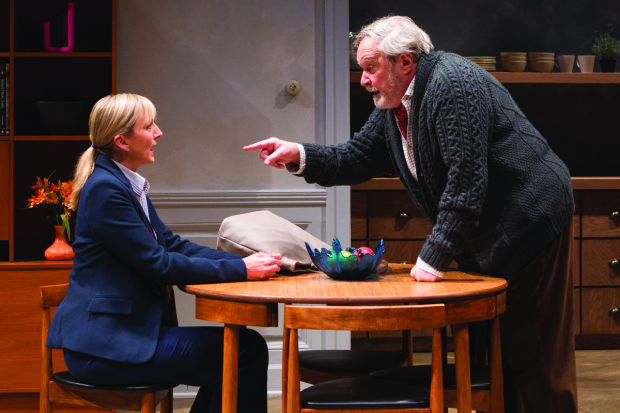The Father

(© Teresa Wood)
Florian Zeller is a young French playwright, whose drama The Father won three prestigious Molière prizes for new French plays in 2014. Happily, Studio Theatre is giving The Father a first-rate production, translated by the brilliant Christopher Hampton.
Often compared to some of the French dramatists of the theater of the absurd and to Harold Pinter, Zeller's work is clearly not designed to make a didactic statement to the public. Instead, The Father seems to meander along a delightfully silly path and then make a sharp turn, then another and another as if it is a detective story waiting to be solved.
The main characters in The Father are André, a gentleman of 80 years, affable though occasionally cruelly honest; and his daughter, Anne, a career woman in her 30s. André is a storyteller who loves to hold court and talk about the wonderful life he had when he was younger. He enjoys his whiskey. Anne knows that much of what he says isn't true: for instance, he wasn't a tap dancer, but an engineer. But she is tired of reprimanding him when he is trying to impress strangers.
And there do seem to be a lot of strangers in André's house. At the beginning of the play, he has just driven out one woman who was supposed to be a helper. She claimed that he swore at her and threatened her with a curtain rod. André's version is that the woman stole his watch. Soon another helper, Laura, comes to visit and learn about André's routine. André's first words to Laura are, "You're…gorgeous" and he insists that he has met her some time earlier.
There are men who appear in André's flat, too. One of them tells André flatly that the apartment he is living in and keeps referring to as his own is not his. It's Anne's. She has moved André in with her because he couldn't take care of himself.
Things get stranger and stranger and do not conform in any way to the laws of logic. A woman comes home with a chicken. The woman does not look like Anne but she is wearing Anne's clothes and gives the chicken to a man who is in the flat, asking him to prepare it. One minute later, the chicken has disappeared and so has the man.
Throughout the beginning of the play, it feels as though people might be playing tricks on André. But it finally becomes clear that Zeller is reproducing the shifting reality inside of André's head, in a mind deteriorating with Alzheimer's. Because he has done this so skillfully and delicately, with so much humor, The Father is not crude. It is a tremendously moving snapshot of memory losing its moorings.
Ted van Griethuysen plays André as anything but an old man refusing to be put in a home. Except when he is truly frightened by the walls closing in at the end of the play, he is straightforward and funny, exhibiting a blend of genteel haughtiness and slight naughtiness. When those walls do begin to move, van Griethuysen makes André's pain excruciating.
Anne is carefully, nobly executed by Kate Eastwood Norris. Her love for her father is paramount. Eastwood Norris' long résumé of classic and modern roles have given her more than enough training to serve as Anne, at once a long-suffering receiver of bad news and a comedian.
Manny Buckley is well-cast as Pierre, Anne's husband. Buckley plays Pierre as slightly resentful of André. Daniel Harray is also cast as Anne's husband, who threatens André. Caroline Dubberly plays Laura, whom André finds attractive; her Laura is more relaxed than all the other caretakers. Erika Rose is superb as the capable woman who appears when André can't recognize Anne.
David Muse directs this 90-minute play so that it moves as swiftly and as sensibly as possible. Debra Booth's set in the first scene is a middle-class Parisian apartment with light modern furniture and touches of color. Gradually, pieces of furniture disappear until the only thing in the empty room is a hospital bed.
Wade Laboissonniere's costumes include chic pants, sweaters, and heels for the women, business suits for the men. André is always in a smoking jacket, pajamas, or sweater.
Sound director Ryan Rumery has created a collection of moody bell tones before the action starts. Lighting designer Keith Parham sets the scenes apart with short blasts of bright white light, then blackouts. It's hard on the eyes but painfully suggests faulty synapses in the brain.
In The Father Zeller makes a profound statement about life in all its phases. Using repeated scenes, shifting identities of characters, and jumping timelines, he suggests the lack of permanence that exists throughout existence, not just at its end. And by making André such a human, honest, imperfect character, he brings forth the audience's empathy for him, as he becomes something of an everyman, cuddled in his nurse's lap.











